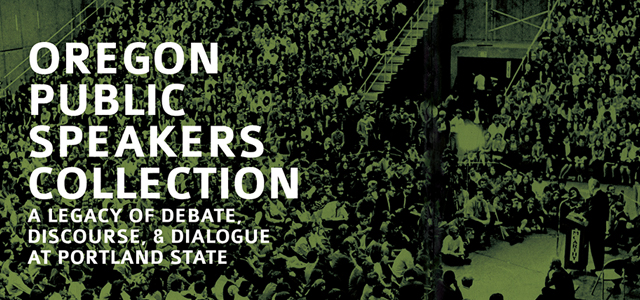Date
1-1972
Series
Speeches by Prominent People
Length
57 minutes
Notes
Senator Wayne Morse, Oregon politician and former candidate for the Democratic Presidential nomination, gained the nickname "The Conscience of the Senate" during his service in the U.S. Senate for his independent stance on numerous contentious issues, including the Vietnam War.
In this recording, Morse points out the need to limit the powers of the presidency, placing particular emphasis on military actions undertaken on the initiative of Presidents Eisenhower, Johnson, and Nixon.
Transferred and preserved by Portland State University Library’s Special Collections with the generous support of the Institute of Museum and Library Services through the Library Services and Technology Act, administered by the Oregon State Library.
Subjects
United States -- Politics and government
Original Format
Reel to reel, 3.75 ips, 1/4 track, mono
Rights
This digital access copy is made available as streaming media for personal, educational, and non-commercial use only. It cannot be reproduced in any form, distributed or played for commercial purposes. It is made accessible because of one or more of the following situations: the rights are owned by State Board of Higher Education, on behalf of Portland State University; Portland State University has permission to make it accessible; it is made accessible for education and research purposes under fair use; or there are no known restrictions on use. In the event that previously unknown information is shared that may change the status of this item, it will be immediately removed from public view until pertinent rights issues are clarified.
Persistent Identifier
http://archives.pdx.edu/ds/psu/11332
Recommended Citation
Morse, Wayne Lyman, ""Limiting the Power of the President"" (1972). Special Collections: Oregon Public Speakers. 113.
http://archives.pdx.edu/ds/psu/11332



Description
Transcript added April 6, 2022.
PSU Library Special Collections and University Archives presents these recordings as part of the historical record. They reflect the recollections and opinions of the individual speakers and are not intended to be representative of the views of Portland State University. They may contain language, ideas, or stereotypes that are offensive to others.